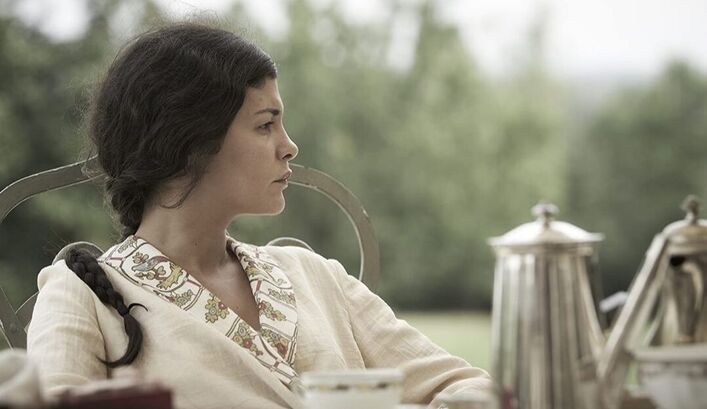THerese D
***
Director: Claude Miller
Screenwriter: Claude Miller based on the novel Thérèse by François Mauriac
Principal cast:
Audrey Tautou
Gilles Lellouche
Anaïs Demoustier
Catherine Arditi
Isabelle Sadoyan
Stanley Weber
Country: France
Classification: M
Runtime: 110 mins.
Australian release date: 11 April 2013
Adapted for the screen from François Mauriac’s novel, Thérèse, this is a complex tale about love and betrayal, set in 1927, in the provincial region of Landes near Bordeaux. It was a time when marriages were arranged to shore up land deals and women went along with the arrangements to shore up their futures. Claude Miller’s film, Thérèse D, creates a disquieting atmosphere between his two main characters, Thérèse (Audrey Tautou) and her husband Bernard Desqueyoux (Gilles Lellouche). Why disquieting? Maybe it is in the casting, as we know Tautou from previous roles where butter wouldn’t melt in her mouth and yet here she portrays a complex woman who is difficult to fathom; a woman who is prepared to resort to extreme measures.
In an interview with Tautou, she said of her character, “Thérèse is a cerebral person. She doesn’t talk much. No-one ever opens up in that family”. For this is the crux of this story; living in a huge house, stuck in relationships with people who are too afraid to speak out makes for a pretty suffocating existence. Bernard’s provincial family are supervised by his mother Madame de la Trave (Catherine Arditi) and his Aunt Clara (Isabelle Sadoyan), who create the atmosphere of an emotional prison where the shackles are manufactured by local convention and tradition. The only breath of fresh air for Thérèse is her sister-in-law Anne (Anaïs Demoustier), who is in love with Jean (Stanley Weber), whom the family don’t approve of. With her husband’s encouragement, Thérèse steps in to sort out the relationship, thus succumbing to the wishes of the family and putting an end to the passionate, illicit love affair.
We are constantly being reminded how the subjugation of women was an on-going problem and for Thérèse, a woman whose avant-garde ideas were out of sync with the times, her dilemma was being caught up in a loveless marriage from which she desperately wanted to escape. The tragedy in this case being Bernard, who is portrayed as nice enough and yet incapable of revealing his true emotions. Is it this lack of passion that drives Thérèse to commit such a ghastly act? In an interview with Miller, he once admitted that, “niceness bores me…” Perhaps this tale is testament to his feelings. Sadly, Thérèse D is the last film the director made; he died in April last year.
Screenwriter: Claude Miller based on the novel Thérèse by François Mauriac
Principal cast:
Audrey Tautou
Gilles Lellouche
Anaïs Demoustier
Catherine Arditi
Isabelle Sadoyan
Stanley Weber
Country: France
Classification: M
Runtime: 110 mins.
Australian release date: 11 April 2013
Adapted for the screen from François Mauriac’s novel, Thérèse, this is a complex tale about love and betrayal, set in 1927, in the provincial region of Landes near Bordeaux. It was a time when marriages were arranged to shore up land deals and women went along with the arrangements to shore up their futures. Claude Miller’s film, Thérèse D, creates a disquieting atmosphere between his two main characters, Thérèse (Audrey Tautou) and her husband Bernard Desqueyoux (Gilles Lellouche). Why disquieting? Maybe it is in the casting, as we know Tautou from previous roles where butter wouldn’t melt in her mouth and yet here she portrays a complex woman who is difficult to fathom; a woman who is prepared to resort to extreme measures.
In an interview with Tautou, she said of her character, “Thérèse is a cerebral person. She doesn’t talk much. No-one ever opens up in that family”. For this is the crux of this story; living in a huge house, stuck in relationships with people who are too afraid to speak out makes for a pretty suffocating existence. Bernard’s provincial family are supervised by his mother Madame de la Trave (Catherine Arditi) and his Aunt Clara (Isabelle Sadoyan), who create the atmosphere of an emotional prison where the shackles are manufactured by local convention and tradition. The only breath of fresh air for Thérèse is her sister-in-law Anne (Anaïs Demoustier), who is in love with Jean (Stanley Weber), whom the family don’t approve of. With her husband’s encouragement, Thérèse steps in to sort out the relationship, thus succumbing to the wishes of the family and putting an end to the passionate, illicit love affair.
We are constantly being reminded how the subjugation of women was an on-going problem and for Thérèse, a woman whose avant-garde ideas were out of sync with the times, her dilemma was being caught up in a loveless marriage from which she desperately wanted to escape. The tragedy in this case being Bernard, who is portrayed as nice enough and yet incapable of revealing his true emotions. Is it this lack of passion that drives Thérèse to commit such a ghastly act? In an interview with Miller, he once admitted that, “niceness bores me…” Perhaps this tale is testament to his feelings. Sadly, Thérèse D is the last film the director made; he died in April last year.
